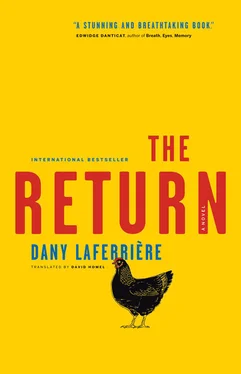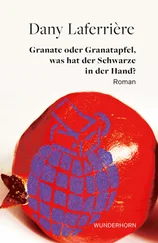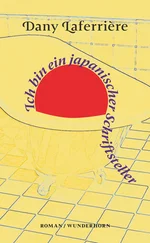The two old ladies are close by.
They evaluate the situation.
Nothing too serious.
The fever has broken, one of them says.
I hear them go slowly down the stairs.
Suddenly the first raindrops fall and everyone runs for shelter under the marquee of the Paramount movie house. For a while, the guy at the ticket counter must think that Godard has become the star of Port-au-Prince. Once the danger passes, I am the only one who stays to watch La Chinoise in the giant theater filled with red staved-in seats.
After the film, I want to walk in the rain.
Up ahead, kids dance
naked under a curtain of water.
The rain gallops toward me.
I hear its music.
An emotion that rises up from childhood.
I go to those kids
playing soccer
in the rain.
Time is fluid.
It’s not that easy
to be in the same place
as your body.
Space and time united.
My mind begins to find rest.
Recovered is the primitive energy
I thought I’d lost
and the wonderment
I felt so long ago
watching the red top
that consumed my childhood
as it turned so fast before my wondering eyes.
Early in the morning
the little girl tries
to light the fire
to make the coffee
that will begin the day
for so many.
We climbed and climbed
the flank of this deforested mountain.
Our necks sweaty.
Noon beating in our throats.
Then at the summit, we discovered
the sea languorously
stretched out along the bay
like a courtesan
on her day off.
Nature immobile.
The sky
the sea
the sun
the stars
and the mountains.
I’d see the same thing
if I returned in a century.
I stand for a while
in this fine drizzle,
my face lifted to the sky.
Naked children from nearby streets
come and encircle me
as if I were a strange apparition.
I speak to them in Creole but that doesn’t work.
Their astonishment keeps me at a distance.
That’s when I understand
that speaking Creole is not enough
to become a Haitian.
In fact it’s too vast a name
to apply to real life.
You can be Haitian only outside of Haiti.
In Haiti people try to find out
if they’re from the same city
the same sex
the same generation
the same religion
the same neighborhood as others.
Those young boys who danced naked
in the rain, I decide
as I go back to the hotel,
did not want any adults to join their game.
Childhood is an exclusive club.
I arrive at the hotel completely soaked and find my sister deep in conversation with the owner. We go up to my room so I can change. She stopped by after work to check up on me because my mother was starting to worry. In a dream she pictured me in some danger. That’s because now I’m in her sensitive zone. During the years I spent in Montreal, she never seemed so concerned as she is now when I’m only ten minutes away. You’re wrong, my sister tells me, she’s been worrying ever since you left. I’ll go see her tomorrow. My sister isn’t fooled by my mother’s subtle emotional blackmail. She knows her well. She has to come home at the same time every day, otherwise my mother gets it into her head to go looking for her in the streets of Port-au-Prince. How do you search for someone in a city of more than two million? My mother does just that. And nine times out of ten, she’ll find my sister.
One of my aunts told me that back when my father was still there, my mother was a carefree young woman. Capricious even. She lost her job after her husband left. She expected as much, but she always thought she’d find something in the private sector. But the dictator had erased the line between public and private. There was nothing but Duvalier, everywhere. Even behind closed doors. People whispered that he could hear what was being said in the bedroom. All territories belonged to him. That was the beginning of my mother’s long descent. It took decades of anxiety, frustration, humiliation and daily struggle to turn this proud and resistant woman into the fragile, worried little bird she has become.
My father always wanted my mother to join him. Despite her wild need to see him again, she did not want her children to grow up in exile. She wanted to give us a sense of country. One night when I was sleeping near her, I heard her murmur in a soft voice that she’d love to touch his face one last time. My father’s features were imprinted on her retina. She missed the weight of his body. She held fast for nearly half a century, divided between her man, her children and her country. She had all of them at once for only a brief time.
I can’t seem to have a personal conversation with my sister. We understand each other too well. I can follow the arc of her life even if I don’t know the events that shape it. Our relationship moves between the closeness of our adolescent years and the distance forced on us by exile. A good deal of that oscillation is due to the fact that we didn’t spend our childhood years together. She stayed in Port-au-Prince with my mother, while I was sent to my grandmother’s in Petit-Goâve. We spent our nights telling ourselves stories. We go about it differently. She tells; I analyze. I give importance to a minor event by tying it to a chain of events that are just as minor. I believe that stories aren’t necessarily big or small but that they’re all linked together. The ensemble forms a hard and compact mass that we can call, for convenience’s sake, life.
My sister and I form a single person. The only thing we can’t share is my father. I’ve always suspected her of hoarding images of my father in action. If anyone could remember his face, it would be her, even if she’s a year younger. I was in Petit-Goâve when my father was in Port-au-Prince. He lived with my mother and my sister in a big wooden house on Magloire-Ambroise Avenue. My sister was three years old and I was four. She’s always maintained she can remember my mother’s voice when she was nursing her. And I’ve always been the only one in the family who believes her. As for me, I remember nothing, except what my mother has told me. Knowing my sister’s exaggerated sensitivity to detail and absolute olfactory abilities, I’m willing to bet she remembers my father’s smell. We can’t speak of his death because we shared nothing of his life.
Aunt Ninine takes me aside. She carefully closes her bedroom door. We stand in the middle of the room. Suddenly, she attacks. You have to save Dany. I have to save myself from what? I’m talking about your nephew, you have to save Dany. From what? You have to do something for him. I don’t understand. He has to leave this place. We decide people’s destinies here? He’s twenty-three years old but his opinion doesn’t count. His life doesn’t belong to him. He absolutely has to leave this place, my aunt repeats. What’s the point, I think, if it only means returning thirty-three years later like me? My mother comes into the room wearing her mischievous smile. Aunt Ninine immediately begins talking about her health. My mother can feel that something is going on and she leaves us to our discussion. I head for the door to escape what’s coming. Just as I’m about to cross the threshold, Aunt Ninine grabs me by the arm. Something tells me that, even if my nephew’s future is important for her, it is not her only concern. Zachée called about your father. Your mother needs your support now. Even if he did disappear, your father was the only man in this house. Her way of blaming me for my absence these last few days, or would that be the last three decades?
Читать дальше












